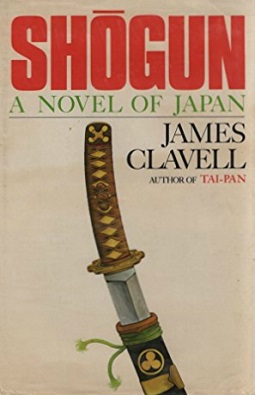Erasmus (Shōgun)

1st edition
|
|
| Author | James Clavell |
|---|---|
| Cover artist | Ed Vebell (illustrated edition only) |
| Country | United Kingdom, United States |
| Language | English |
| Series | The Asian Saga |
| Genre | Historical fiction |
| Publisher | Delacorte Press (US) Hodder & Stoughton (UK) |
|
Publication date
|
1975 |
| Media type | Print (Hardback & Paperback) |
| Pages | 1152 pp (first edition, paperback) |
| ISBN | (US) – ISBN (UK) |
| OCLC | 9326267 |
| 823/.914 19 | |
| LC Class | PS3553.L365 S5 1975 |
| Preceded by | first book of series |
| Followed by | Tai-Pan |
Shōgun is a 1975 novel by James Clavell. It is the first novel (by internal chronology) of the author's Asian Saga. A major bestseller, by 1990 the book had sold 15 million copies worldwide. Beginning in feudal Japan some months before the critical Battle of Sekigahara in 1600, Shōgun gives an account of the rise of the daimyō "Toranaga" (based upon the actual Tokugawa Ieyasu). Toranaga's rise to the shogunate is seen through the eyes of the English sailor John Blackthorne, called Anjin ("Pilot") by the Japanese, whose fictional heroics are loosely based on the historical exploits of William Adams.
Feudal Japan in 1600 is in a precarious peace. The heir to the Taiko (Regent) is too young to rule, and the most powerful five overlords of the land hold power as a Council of Regents. Portugal, with its vast sea power, and the Catholic Church mainly through the Order of the Jesuits, have gained a foothold in Japan and seek to extend their power. But Japanese society is insular and xenophobic. Guns and Europe's modern military capabilities are still a novelty and despised as a threat to Japan's traditional Samurai warrior culture.
John Blackthorne, an English pilot, serving on the Dutch warship Erasmus, is the first English pilot to reach Japan. England (and Holland) seek to disrupt Portuguese (and Catholic) relations with Japan and establish ties of their own through trade and military alliances.
Erasmus is blown ashore on the Japanese coast at the village of Anjiro during a storm. Blackthorne and the few survivors of his crew are taken captive by local samurai, Kasigi Omi, until his daimyō (feudal lord) and uncle, Kasigi Yabu, arrives. Yabu puts Blackthorne and his crew on trial as pirates, using a Jesuit priest to interpret for Blackthorne. Losing the trial, Blackthorne attacks the Jesuit, rips off his crucifix, and stamps it into the dust to show the daimyō that the priest is his enemy. The Japanese, who know only the Catholic version of Christianity, are shocked by the gesture. Yabu sentences Blackthorne and his crew to death. However, Omi, who is quickly proving himself as a clever adviser, convinces Yabu to spare them in order to learn more about European ways.
...
Wikipedia
